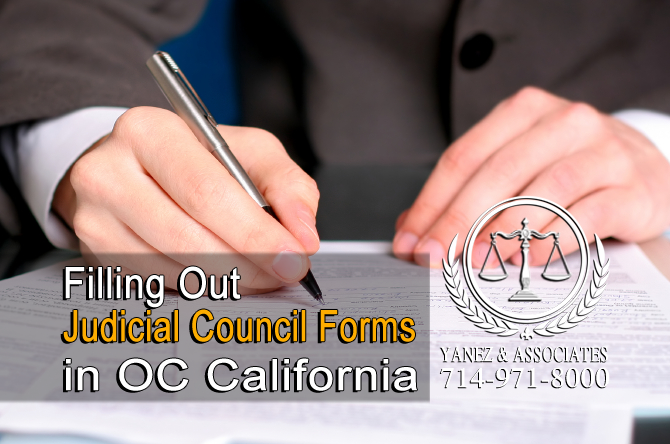Q: At my last family law court appearance in Orange County, the judge would not allow me to speak for as long as I wanted, is there anything I can do?
I Was Not Allowed to Speak As Much As I Wanted at My Last Court Appearance in Orange County. What Can I Do?
When you appear in court, whether represented by a lawyer or on your own, you will have certain things that you wish to tell the court and the judge. However, it may not always be up to you whether you have the opportunity to say everything that you wish to.
Remember that the purpose of the hearing is not to present new information to the court. You have the opportunity to say as much as you want to say while you are filling out your court forms, and that while the other party and the judge will have the information that you provide prior to your hearing, you will also have the information that they wish to present to the Court.
One of the reasons that this blog so strongly and continually encourages that in addition to reading about the legal process online, you consult with a qualified attorney who can explain how the law applies to your unique case is that your attorney can give you information that allows you to put your best case forward. He or she can look over your court documents and help you fill them out completely and accurately, as well as ensure that you have chosen the correct forms.
If you were not allowed to speak as much as you wanted to in your previous hearing, make sure that you discuss your situation with a qualified California lawyer. If there are any additional forms that you may need to fill out, ask your attorney. In some cases, you may be able to retract previous forms and re-file new versions. Make sure to consult an Orange County attorney while filling out your new court forms.
An Introduction to Court Forms in California Courts
Whether you are initiating a court case, amending an old one, or you have been served with court papers, you should have a basic understanding of how court documents work.
The purpose of court documents is so that you, the court, and the other party all have the same information about the legal case in which you are involved. Both parties will have the opportunity to share their stories, present and request information, and state what they wish for the outcome of the case. Your court forms combined with the forms of the other party will give the court the information necessary to make a decision regarding your case.
In addition, you and the other party may need to be present at a court hearing, where information may be presented orally. It is important to put the appropriate and relevant information in writing prior to the hearing because you don’t know ahead of time how much time you will have for speaking in court.
The court has a set of forms that are premade and ready for purchase at the courthouse. These are called Judicial Council Forms, and they are divided into two sections: adopted forms and approved forms. Adopted judicial council forms are mandatory, meaning that if your case falls under certain criteria, it is necessary for you to use the specific form. Approved judicial council forms, on the other hand, are optional. The information you could put on an approved form may be helpful to your case, but you have the option of using the form or creating your own form.
Help From an Attorney
This is where an attorney can come in handy! If you weren’t able to present the information that you wanted to present in your last hearing, you may not have filled out all of the correct forms, or included all of the relevant information. Always check with an attorney to make sure that
• You have the right forms,
• You have all of the forms that you need,
• Your forms are filled out completely,
• The information you provided is accurate,
• That no additional information should be added, and
• That any additional, local forms that are specific to your case and location are included.
Filling Out Judicial Council Forms in OC California
When you’re ready to fill out your court forms, at any stage of the court process, first, read over the form. Most judicial council forms contain instructions either on one side or the back of the page so that you understand what the form is intended for, and how to fill it out. Sometimes, judicial council forms simply provide you with information that you need for court.
In order to get even more information about your court forms, look to the bottom right corner for references to the judicial code or California law that the forms apply to. You can research the law on your own, or ask your attorney. Remember, the more you understand about what is going on, the better off you’ll be. Your attorney should help you and ensure that you understand what is going on in your case so that you can make informed decisions.
The California Courts website provides the following tips for filling out court forms in California.
• Have the most recent version of the form that you are filling out. The courts do update forms over time. Look to the bottom left corner to see the last date that your form was updated, or check online for the most recent version. When you pick up your court form, either compare it to the date online, or ask the clerk if it is the most recent version of the form.
• Write clearly, use black or blue ink, type your form, or have someone with neat handwriting fill it out for you. Forms are available online for use on a computer, which is always legible.
• The court form will ask for your contact information. If you are not comfortable providing your home address, especially in cases of abuse or neglect, or those involving divorce or children, choose another address where you can receive mail, such as a PO box or your work address.
• If your address changes during your case, make sure that you file a Change of Address with the court.
• On most forms, you’ll need to fill out an introduction to yourself at the front of the forms. Keep this the same on all forms so that the court can easily keep all of your forms together.
• Have you attorney or a family law facilitator look over your forms. They should be filled out completely and accurately. If you have a lawyer, fill out his or her information where requested; if not, fill out “self represented” instead. If a section does not apply to you, write “not applicable” or “n/a”.
• When the form asks for your signature, sign when you are ready to submit - after you have read over the completed form, after you have had it looked at by an attorney, and after you are ready to submit it to the court.
• You will always need copies of your forms: one for you, one for the other party, and the original for the court. It may be a good idea to have an additional copy for you. Make sure you copy both sides of double sided forms.
• Always have your copies of the forms with you when you go to the court, whether it’s for hearings, submitting paperwork, to ask a question, etc.
When you file court forms with the clerk, remember that you will usually need to pay a filing fee. It is also necessary to serve the papers you file on the other part prior to the hearing date, and within a specific timeline according to your case. Check with your attorney so that you understand which forms need to be served, when they need to be served, and how to serve them in your best interests.
To serve court forms on the other party, you’ll need another person who is at least 18 years old and is not involved in the case. Sometimes close friends and family members are too close to either or both parties to be asked to serve papers. A process server is always a safe bet.
The person will need to deliver the papers to the other party. In some cases, you may be able to serve papers through first class mail.
Once the other party has been served, make sure you file a proof of service with the court. This is one of the most important parts of your case - it ensures that the court knows that the other party was served with the papers regarding your case.
Worried about the family law court appearance? Contact our California Family Law Attorneys for help!

Q: I am worried about my family law court appearance? A: Call and schedule a free consultation with one of our Family Law Attorneys to help you understand your legal rights.
If you have questions regarding your family law case in California, it can only help for you to contact an attorney to discuss your case. A qualified lawyer can ensure that you have all appropriate forms and that they are filled out completely and correctly. Contact the attorneys at Yanez & Associates today to schedule your free initial consultation.











